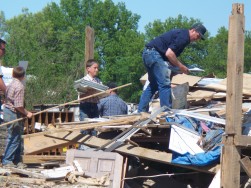Without a doubt, our hearts ache for the people of Oklahoma. We wait, almost holding our breath, for additional news and stories of hope and survival. Disasters unify us. They bring all Americans together in support and encouragement like nothing else can. They are a testament to the strength and power of the human spirit. Disasters bring out the best in most of us, inspiring us to help and bring comfort.My years in emergency management, both responding to and supporting disaster response, helped me gain a whole new perspective on this issue.
Why money is the best way to help following a disaster:
1. Money is easily transported. It doesn’t require fuel, trucks, drivers, travel expenses, warehouses, volunteers or hired labor to load or unload it. I promise you, right now, communities all over America are working to fill trucks with toiletries, bottled water, non-perishables, etc. They will rent or find a donated truck, someone to drive it, incurring fuel and travel expenses to drive all this stuff to a community which already has an overloaded response system.
Incident managers or church disaster leadership will now have to find somewhere amongst all the heavy damage to store all these donations, and recruit volunteers or hire people to parcel it out. This means that volunteers will have to be pulled from other, more critical functions (like helping in shelters, feeding and providing comfort to victims, or from cleaning up the community) to manage STUFF. Most likely they will receive enough deodorant, toothbrushes and razors to last for years! Systems are already in place to take care of these kinds of supplies. I promise you, the Salvation Army, and the Red Cross are all over this, and have been for years.
2. Victims can purchase what they need. Every family is different, and every family’s needs are different. Within the Red Cross, all monies donated to a particular disaster are used just for that disaster. (I can’t speak for the system in place for the Salvation Army, I don’t have the experience with them.) Based on need, families are provided with essentially a loaded credit card that they can use to purchase the supplies they need. Isn’t it sort of judgmental of us to think, “I want to help you, but I don’t want to give you money because I don’t know how you’ll spend it. I want to give you things you’ll need.” But really, is it? So WHAT if a family uses their card to buy their 9-year old an Xbox? They just lost everything! Does it really matter, in the large scheme of things?
Or maybe you feel that giving money seems impersonal, because it wasn’t something you chose yourself. It didn’t require any effort. If it happened to you, wouldn’t it give you warm fuzzies that people cared enough that they gave unselfishly so you could purchase what your family needed?
3. Money is good for the local economy. People who receive assistance use it to buy supplies in their local community. This helps stimulate their economy, which brings businesses back. I heard a statistic on the radio that says over 40% of small businesses don’t reopen after a disaster. So spending money locally is a really, really, really good thing.
4. People in shelters will have medical needs, or other special care needs. And don’t forget about the pets! After Katrina, most disaster response organizations are now partnering with other organizations or planning for people’s pets. Money will help provide care for the victims on this level. These organizations do a GREAT job of looking after these folks!
This community will be recovering for years after this disaster. People’s needs will be ongoing, and rescue organizations will be on the ground helping. So please, make your donation count, and give the gift that’s truly going to help them: money. 🙂


